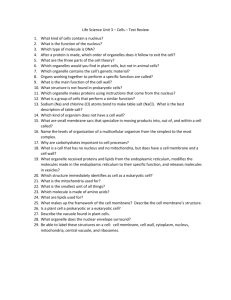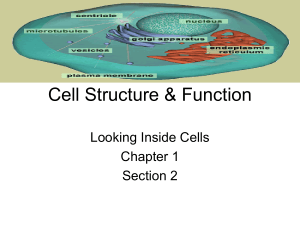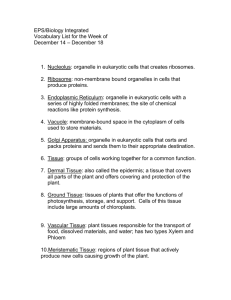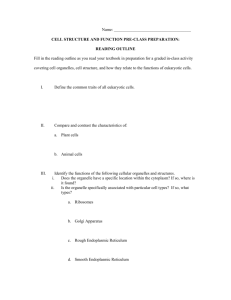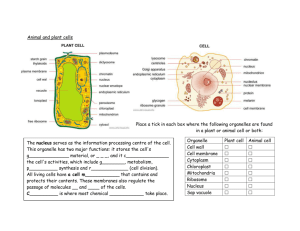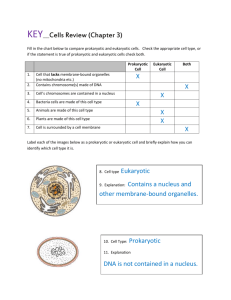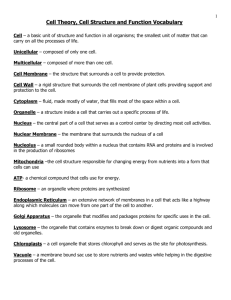Cell Structure and Function Study Guide
advertisement
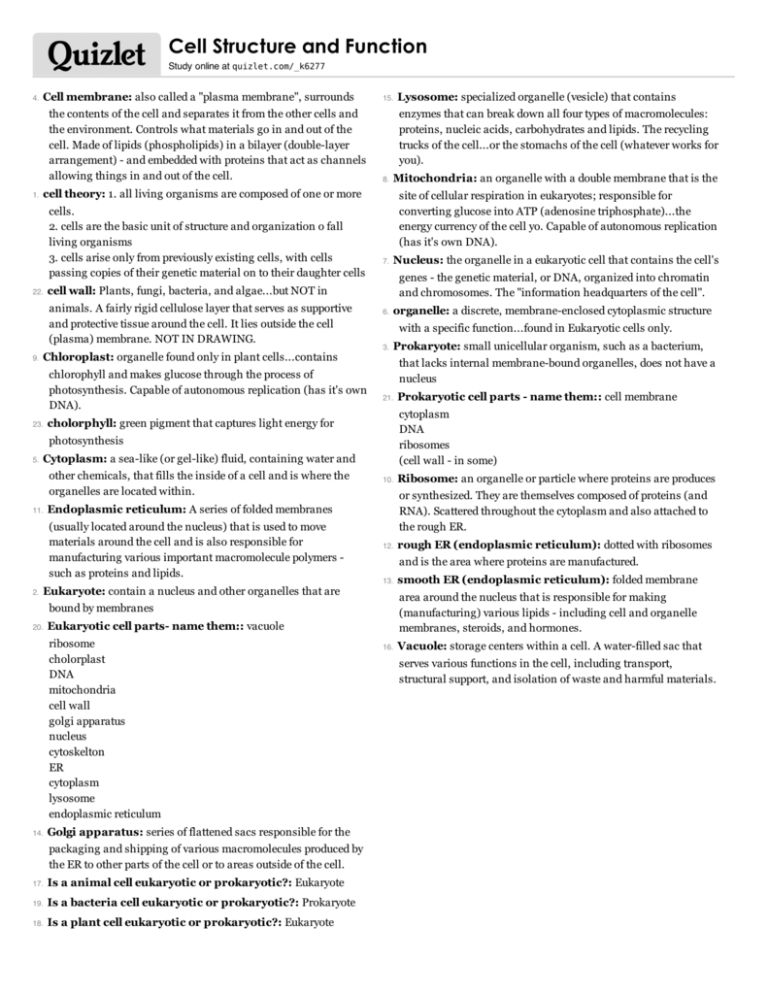
Cell Structure and Function Study online at quizlet.com/_k6277 4. Cell membrane: also called a "plasma membrane", surrounds the contents of the cell and separates it from the other cells and the environment. Controls what materials go in and out of the cell. Made of lipids (phospholipids) in a bilayer (double-layer arrangement) - and embedded with proteins that act as channels allowing things in and out of the cell. 1. 22. 8. Mitochondria: an organelle with a double membrane that is the Chloroplast: organelle found only in plant cells...contains chlorophyll and makes glucose through the process of photosynthesis. Capable of autonomous replication (has it's own DNA). 23. site of cellular respiration in eukaryotes; responsible for converting glucose into ATP (adenosine triphosphate)...the energy currency of the cell yo. Capable of autonomous replication (has it's own DNA). 7. Nucleus: the organelle in a eukaryotic cell that contains the cell's genes - the genetic material, or DNA, organized into chromatin and chromosomes. The "information headquarters of the cell". cell wall: Plants, fungi, bacteria, and algae...but NOT in animals. A fairly rigid cellulose layer that serves as supportive and protective tissue around the cell. It lies outside the cell (plasma) membrane. NOT IN DRAWING. 6. organelle: a discrete, membrane-enclosed cytoplasmic structure 3. Prokaryote: small unicellular organism, such as a bacterium, with a specific function...found in Eukaryotic cells only. that lacks internal membrane-bound organelles, does not have a nucleus 21. Cytoplasm: a sea-like (or gel-like) fluid, containing water and other chemicals, that fills the inside of a cell and is where the organelles are located within. 11. 2. 10. Eukaryote: contain a nucleus and other organelles that are 12. 13. 14. Golgi apparatus: series of flattened sacs responsible for the packaging and shipping of various macromolecules produced by the ER to other parts of the cell or to areas outside of the cell. 17. Is a animal cell eukaryotic or prokaryotic?: Eukaryote 19. Is a bacteria cell eukaryotic or prokaryotic?: Prokaryote 18. Is a plant cell eukaryotic or prokaryotic?: Eukaryote smooth ER (endoplasmic reticulum): folded membrane area around the nucleus that is responsible for making (manufacturing) various lipids - including cell and organelle membranes, steroids, and hormones. Eukaryotic cell parts- name them:: vacuole ribosome cholorplast DNA mitochondria cell wall golgi apparatus nucleus cytoskelton ER cytoplasm lysosome endoplasmic reticulum rough ER (endoplasmic reticulum): dotted with ribosomes and is the area where proteins are manufactured. bound by membranes 20. Ribosome: an organelle or particle where proteins are produces or synthesized. They are themselves composed of proteins (and RNA). Scattered throughout the cytoplasm and also attached to the rough ER. Endoplasmic reticulum: A series of folded membranes (usually located around the nucleus) that is used to move materials around the cell and is also responsible for manufacturing various important macromolecule polymers such as proteins and lipids. Prokaryotic cell parts - name them:: cell membrane cytoplasm DNA ribosomes (cell wall - in some) cholorphyll: green pigment that captures light energy for photosynthesis 5. Lysosome: specialized organelle (vesicle) that contains enzymes that can break down all four types of macromolecules: proteins, nucleic acids, carbohydrates and lipids. The recycling trucks of the cell...or the stomachs of the cell (whatever works for you). cell theory: 1. all living organisms are composed of one or more cells. 2. cells are the basic unit of structure and organization o fall living organisms 3. cells arise only from previously existing cells, with cells passing copies of their genetic material on to their daughter cells 9. 15. 16. Vacuole: storage centers within a cell. A water-filled sac that serves various functions in the cell, including transport, structural support, and isolation of waste and harmful materials.
